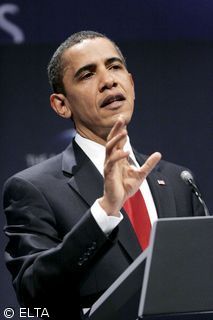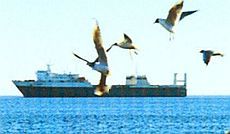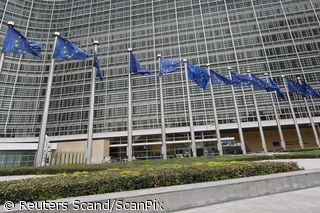For several years the position of Polish exporters on the markets of the former Commonwealth of Independent States has been clearly weakening
Published:
5 May 2003 y., Monday
In order to spur on trade, presentations of Polish exporters are gaining popularity. One such presentation is the Polish National Exhibition in St. Petersburg.
Geographic proximity, relatively small competition from local manufacturers who are not capable of satisfying the growing demand for modern products and, contrary to common belief, the increasingly wealthy and demanding customer, are the advantages of the "eastern market." Why then does trade with the countries of the Commonwealth of Independent States (CIS) constitute as little as 7.1 percent of the global value of Polish export?
The position of Polish companies is weakened by competition from the Western businesses that are perfectly aware of the perspectives which an active and strategically planned entry into Eastern markets can accomplish. Entrepreneurs from Germany, France and the United States, supported by the appropriate funds, first promote and then successfully sell their products in Russia and Ukraine or make direct investments there.
The decrease in the amount of Polish agriculture and food products exported to Eastern markets has stemmed from the fact that big international concerns such as Nestlé, Danone or Unilever directly entered this strategic area. However, the issue of Western competition is only a part of the answer to this question and the possibility of development for Polish exporters on the markets in the former Soviet Union.
One of the most serious difficulties Polish companies encounter is a considerable risk connected with signing commercial contacts with partners from the East who frequently appear to be insolvent and do not honor their contracts. According to Robert Stawski from the Promotion Chamber of the Polish Chamber of Commerce, businesspeople from Russia frequently do not understand the term "advance payment" and sometimes want to pay for the products only after they sell them. For obvious reasons, these terms are hard to accept for Polish manufacturers, which are mostly small and medium-sized companies. The state does not guarantee any protection for companies against situations in which partners from Russia, Belarus or Ukraine do not fulfill the terms of a commercial contract.
Šaltinis:
warsawvoice.pl
Copying, publishing, announcing any information from the News.lt portal without written permission of News.lt editorial office is prohibited.
The most popular articles
 Standard & Poor's (S&P) affirmed Lithuania's long-term investment grade sovereign foreign currency BBB credit rating and removed it from a CreditWatch negative position, citing government commitments to address deteriorating public finances.
more »
Standard & Poor's (S&P) affirmed Lithuania's long-term investment grade sovereign foreign currency BBB credit rating and removed it from a CreditWatch negative position, citing government commitments to address deteriorating public finances.
more »
 The EBRD-EIB Multilateral Carbon Credit Fund (MCCF) and Azerenerji Joint Stock Company are collaborating in order to promote energy-efficient power generation in Azerbaijan.
more »
The EBRD-EIB Multilateral Carbon Credit Fund (MCCF) and Azerenerji Joint Stock Company are collaborating in order to promote energy-efficient power generation in Azerbaijan.
more »
 U.S. President Barack Obama, meeting with the leaders of Mexico and Canada, called on all three nations hit by the global recession to avoid resorting to protectionism.
more »
U.S. President Barack Obama, meeting with the leaders of Mexico and Canada, called on all three nations hit by the global recession to avoid resorting to protectionism.
more »
 A 10-year $75 million EBRD loan will finance the construction of a combined heat and power plant in the east Siberian city of Krasnoyarsk which is expected to improve energy efficiency and cut pollution by 14 percent thanks to the use of more environmentally-friendly technologies.
more »
A 10-year $75 million EBRD loan will finance the construction of a combined heat and power plant in the east Siberian city of Krasnoyarsk which is expected to improve energy efficiency and cut pollution by 14 percent thanks to the use of more environmentally-friendly technologies.
more »
 The Directorate-General for Competition has issued a review of the aid schemes introduced by Member States and approved by the Commission during the financial crisis.
more »
The Directorate-General for Competition has issued a review of the aid schemes introduced by Member States and approved by the Commission during the financial crisis.
more »
 Rescue planes from New Zealand have been taking part in a massive search for passengers after a ferry sank off the coast of Tonga. At least 27 people are missing.
more »
Rescue planes from New Zealand have been taking part in a massive search for passengers after a ferry sank off the coast of Tonga. At least 27 people are missing.
more »
 Courtney Adams has always loved cooking. As a kid she baked brownies for her friends and in college her apartment was the place to go to for a home-cooked meal. But she never thought she'd cook for a living.
more »
Courtney Adams has always loved cooking. As a kid she baked brownies for her friends and in college her apartment was the place to go to for a home-cooked meal. But she never thought she'd cook for a living.
more »
 The European Commission has authorised, under EC Treaty state aid rules, a scheme offering reduced-interest loans to businesses investing in the production of environmentally friendly products, as part of the German package to tackle the current economic crisis.
more »
The European Commission has authorised, under EC Treaty state aid rules, a scheme offering reduced-interest loans to businesses investing in the production of environmentally friendly products, as part of the German package to tackle the current economic crisis.
more »
 Ramūnas Bičiulaitis, former board member and financial director of AB LEO LT, starts working as head of the Finance Department of Danske Bankas.
more »
Ramūnas Bičiulaitis, former board member and financial director of AB LEO LT, starts working as head of the Finance Department of Danske Bankas.
more »
 The EBRD has kept up a rapid pace in the syndicated loans market, defying difficult market conditions and pulling together nine deals so far this year, worth a total €1.2 billion.
more »
The EBRD has kept up a rapid pace in the syndicated loans market, defying difficult market conditions and pulling together nine deals so far this year, worth a total €1.2 billion.
more »